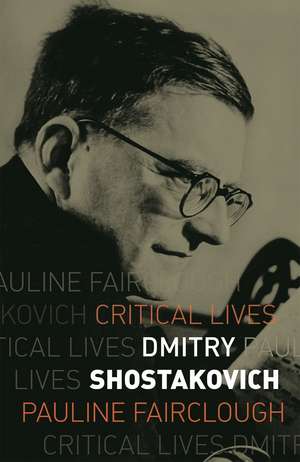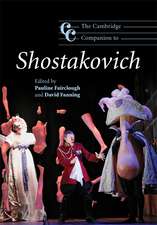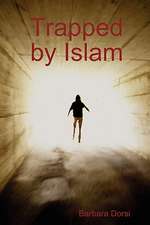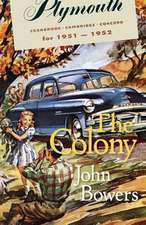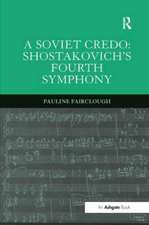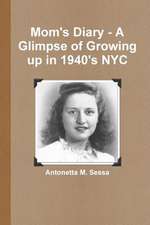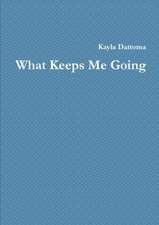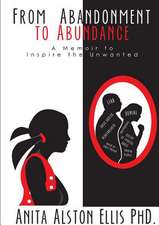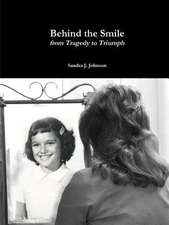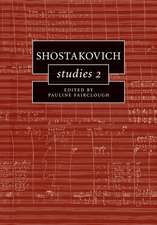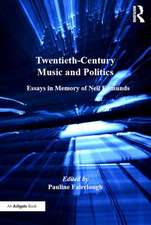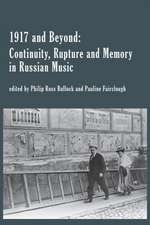Dmitry Shostakovich: Critical Lives
Autor Pauline Faircloughen Limba Engleză Paperback – 11 sep 2019
Dmitry Shostakovich was one of the most successful composers of the twentieth century—a musician who adapted as no other to the unique pressures of his age. By turns vilified and feted by Stalin during the Great Purge, Shostakovich twice came close to succumbing to the whirlwind of political repression of his times and remained under political surveillance all his life, despite the many privileges and awards heaped upon him in old age. Through it all, Shostakovich showed a remarkable ability to work with, rather than against, prevailing ideological demands, and it was this quality that ensured both his survival and his musical posterity.
Pauline Fairclough’s absorbing new biography offers a vivid portrait of Shostakovich. Featuring quotations from previously unpublished letters as well as rarely seen photographs, Fairclough’s book provides fresh insight into the music and life of a composer whose legacy, above all, was to have written some of the greatest and most cherished music of the last century.
Pauline Fairclough’s absorbing new biography offers a vivid portrait of Shostakovich. Featuring quotations from previously unpublished letters as well as rarely seen photographs, Fairclough’s book provides fresh insight into the music and life of a composer whose legacy, above all, was to have written some of the greatest and most cherished music of the last century.
Din seria Critical Lives
-
 Preț: 81.37 lei
Preț: 81.37 lei -
 Preț: 83.07 lei
Preț: 83.07 lei - 5%
 Preț: 79.31 lei
Preț: 79.31 lei -
 Preț: 84.23 lei
Preț: 84.23 lei -
 Preț: 82.98 lei
Preț: 82.98 lei -
 Preț: 83.16 lei
Preț: 83.16 lei -
 Preț: 82.01 lei
Preț: 82.01 lei - 13%
 Preț: 83.98 lei
Preț: 83.98 lei -
 Preț: 83.48 lei
Preț: 83.48 lei -
 Preț: 82.64 lei
Preț: 82.64 lei -
 Preț: 82.64 lei
Preț: 82.64 lei -
 Preț: 83.44 lei
Preț: 83.44 lei -
 Preț: 81.74 lei
Preț: 81.74 lei -
 Preț: 82.01 lei
Preț: 82.01 lei -
 Preț: 140.04 lei
Preț: 140.04 lei -
 Preț: 83.44 lei
Preț: 83.44 lei -
 Preț: 83.81 lei
Preț: 83.81 lei -
 Preț: 83.38 lei
Preț: 83.38 lei -
 Preț: 84.20 lei
Preț: 84.20 lei -
 Preț: 82.01 lei
Preț: 82.01 lei -
 Preț: 83.07 lei
Preț: 83.07 lei -
 Preț: 83.07 lei
Preț: 83.07 lei -
 Preț: 83.07 lei
Preț: 83.07 lei -
 Preț: 83.07 lei
Preț: 83.07 lei -
 Preț: 83.07 lei
Preț: 83.07 lei -
 Preț: 82.54 lei
Preț: 82.54 lei -
 Preț: 82.64 lei
Preț: 82.64 lei -
 Preț: 82.54 lei
Preț: 82.54 lei - 6%
 Preț: 131.57 lei
Preț: 131.57 lei -
 Preț: 83.44 lei
Preț: 83.44 lei -
 Preț: 79.07 lei
Preț: 79.07 lei -
 Preț: 119.81 lei
Preț: 119.81 lei -
 Preț: 137.83 lei
Preț: 137.83 lei -
 Preț: 83.07 lei
Preț: 83.07 lei -
 Preț: 81.55 lei
Preț: 81.55 lei -
 Preț: 82.89 lei
Preț: 82.89 lei -
 Preț: 81.38 lei
Preț: 81.38 lei -
 Preț: 83.07 lei
Preț: 83.07 lei -
 Preț: 83.27 lei
Preț: 83.27 lei -
 Preț: 139.57 lei
Preț: 139.57 lei -
 Preț: 83.07 lei
Preț: 83.07 lei -
 Preț: 85.74 lei
Preț: 85.74 lei -
 Preț: 82.54 lei
Preț: 82.54 lei -
 Preț: 81.74 lei
Preț: 81.74 lei -
 Preț: 83.70 lei
Preț: 83.70 lei -
 Preț: 83.34 lei
Preț: 83.34 lei -
 Preț: 82.64 lei
Preț: 82.64 lei -
 Preț: 83.95 lei
Preț: 83.95 lei -
 Preț: 83.44 lei
Preț: 83.44 lei
Preț: 82.64 lei
Nou
Puncte Express: 124
Preț estimativ în valută:
15.81€ • 16.51$ • 13.09£
15.81€ • 16.51$ • 13.09£
Carte disponibilă
Livrare economică 15-22 martie
Livrare express 01-07 martie pentru 23.38 lei
Preluare comenzi: 021 569.72.76
Specificații
ISBN-13: 9781789141276
ISBN-10: 1789141273
Pagini: 192
Ilustrații: 25 halftones
Dimensiuni: 127 x 197 x 20 mm
Greutate: 0.32 kg
Ediția:1
Editura: REAKTION BOOKS
Colecția Reaktion Books
Seria Critical Lives
ISBN-10: 1789141273
Pagini: 192
Ilustrații: 25 halftones
Dimensiuni: 127 x 197 x 20 mm
Greutate: 0.32 kg
Ediția:1
Editura: REAKTION BOOKS
Colecția Reaktion Books
Seria Critical Lives
Notă biografică
Pauline Fairclough is professor of music at the University of Bristol and the author, most recently, of Classics for the Masses: Shaping Soviet Musical Identity Under Lenin and Stalin.
Recenzii
“Few composers have been subjected to such longstanding distortions regarding their music and political outlook as Shostakovich. Fairclough acknowledges these minefields, and in this vivid and lucidly expounded study manages to steer a pragmatic course through the many controversial issues that blighted his career. Her fair-minded approach and scrupulous attention to detail, supported by references to newly discovered or previously unpublished archival material, combines cutting edge scholarship with tremendous insight into Shostakovich's complex personality. The picture that emerges is far more rounded and I dare say more human than has been the case with previous biographies of the composer. In this respect, Fairclough is particularly sensitive in dealing with Shostakovich's often problematic relationships with women. There’s a real artfulness, too, in the way that she manages to weave Shostakovich's life and works into a gripping entity. In particular, Fairclough makes a convincing case for re-evaluating some of the much criticized music he composed to fulfill political obligations made by the soviet state.”
“This book invites you to see more. . . . [The author] wants you to stand back and take a broader view of a creative artist who made use of the system that otherwise oppressed him, playing it at its own game. And she makes the point that Western readings of Shostakovich have been suspiciously changeable over time, for reasons that relate to politics as much as music.”
"A superbly nuanced account of a musical homo sovieticus who sampled all of the century’s emotions, from Leninist exhilaration to Stalinist despair, from youthful dreams of a better society to a desperate struggle to appease the commissars."
"This is a sensible and insightful book. Much of Shostakovich’s reception has been distracted by political agendas wielded both for and against the man and his works, and interpretation of the music has often been a fraught affair played for high stakes. Fairclough deals with these 'Shostakovich Wars' calmly and judiciously, without attempting to resolve 'his divided existence' in favor of either his public or private side. . . . There is much to be gained from this slim volume. . . . Aside from the program notes on individual works, which consist of the sorts of explications that the general reader might desire (the string quartets are treated to some wonderful interpretative prose), the book also includes genuinely new archival material. . . . Shostakovich’s film music is given space alongside his concert music, all the better for the book’s portrait of the composer as a Soviet artist."
"Fairclough provides lucid, no-nonsense commentary. A Bristol-based academic who has published widely on Shostakovich reception history, she pitches her stall on the fact-based, non-conjectural side of the debate without dissing conflicting ideas with the belligerence associated with a scholar such as Richard Taruskin. . . . What gives her slim volume its distinctive tone is the way Fairclough searches out biographical and stylistic continuities where others see only disjunctive leaps."
"Fairclough’s elegantly written and richly documented biography of the twentieth-century cultural icon Dmitri Shostakovich offers a fair-minded view of the myriad personal and musical political issues that challenged the composer from his student days at the Leningrad Conservatory until his death in Moscow in 1975. . . . Fairclough’s biography makes an important contribution to Shostakovich scholarship and Russian historical and cultural studies. The discussion of selected musical works interspersed throughout Shostakovich’s compositional life and the incorporation of illustrations from the Shostakovich archives in Moscow contribute substantially to the richness of this book. It serves as an essential point of reference for future studies on Shostakovich and the musical culture of Soviet Russia."
"This is an excellent, thoroughly researched, brief biography of the famous and still controversial Soviet composer Dmitry Shostakovich. Fairclough has done a fine job of presenting Shostakovich's life and works within their artistic and political contexts. She is fair to the composer and sensitive to the enormous political pressures he suffered, pressures that were literally matters of life and death. Fairclough also provides real intellectual substance, describing musical compositions in an informative manner without resorting to detailed musical analyses. Informed music lovers without a background in music theory and harmony will find much of great interest. Musicians and music historians will also benefit from Fairclough’s specialist insights into biographical details garnered from her work in Russian archives. The book includes many fine photographs, a brief but useful bibliography, and end notes. . . . Highly recommended."
“Fairclough’s attractively readable and fairminded new biography sails elegantly past old arguments while taking fascinating account of the mass of new research that has appeared in recent years.”
